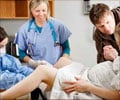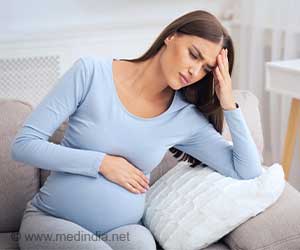Postponing childbirth could be inviting risks, Australian women have been warned time and again. But they do not seem to care.
Postponing childbirth could be inviting risks, Australian women have been warned time and again. But they do not seem to care.
More than one in five babies in New South Wales are born to mothers aged over 35, and almost one in three is delivered by caesarean section, latest figures reveal.Risks of pregnancy complications and birth defects increase as women age. Besides delaying motherhood was a big factor in rising caesarean rates, maternity experts said.
"Mothers are continuing to get older; clearly the message isn't getting through," said obstetrician Michael Nicholl from NSW Health's Maternal and Perinatal Health Priority Taskforce.
The birth rate in NSW had risen 8.3 per cent in two years, and mothers aged 35-39 led the boom, according to the NSW Mothers And Babies Report 2006, made public today.
NSW Health Minister John Della Bosca said the Government was spending an extra $46.4 million over four years to recruit more obstetricians and midwives.
For the first time, fewer than half of all babies born in private hospitals had been delivered by normal vaginal birth, Sydney Morning Herald reported.
Advertisement
The Mater at North Sydney and Kareena Private Hospital in Sutherland Shire had rates of 32 per cent.
Advertisement
Obstetricians say obesity rates and a changing ethnic mix have also contributed to the rise of elective and emergency caesareans.
Over 10 years, surgical births had risen by more than 60 per cent, from 17.6 per cent to 28.8 per cent of all births. Normal vaginal births had fallen from more than 70 per cent to 60.4 per cent in the same period.
Dr Nicholl said the increased level of medical intervention could not be explained by older mothers alone.
He said many first-time mothers who have their labour induced do not progress well and go on to need forceps or vacuum delivery, or caesarean section.
"There is a level of fear attached to childbirth, and women who have had a caesarean section are fearful of trying to have a vaginal birth the next time."
Midwives have accused obstetricians of "hijacking" birth and say the rate is higher than it should be because labour is treated as a sickness rather than as a normal part of life.
The report shows that teenage pregnancy is becoming less common - there are now as many women having babies after the age of 40 as there are aged 19 or under.
Danny Challis, clinical director of obstetrics and foetal maternal medicine at the Royal Hospital for Women, said having a baby in one's late 30s or early 40s was almost the norm now.
"Even though the complication rate is higher, we are quite used to looking after these women now, and the vast majority still manage to have a successful pregnancy," he said.
Dr Challis said NSW Health expressly aimed to reduce the level of medical intervention, with a ban on elective or prelabour caesareans unless there were compelling medical indications that one would be necessary before 39 weeks' gestation.
Women who have caesareans require longer stays in hospital; there is an increased risk of complications from surgery and they take longer to recover than those who give birth naturally.
Their babies are also more likely to be born premature, have serious breathing problems or need intensive care.
Source-Medindia
GPL/S











